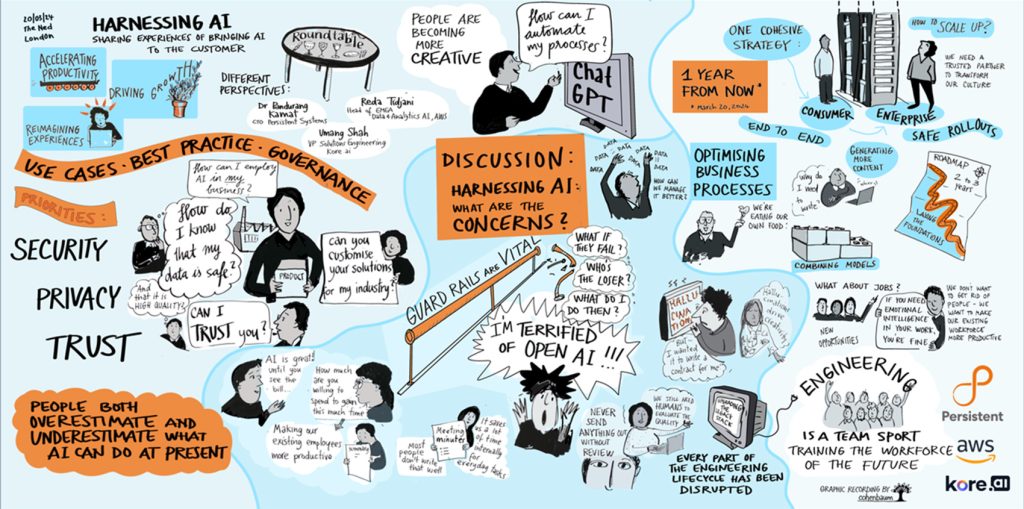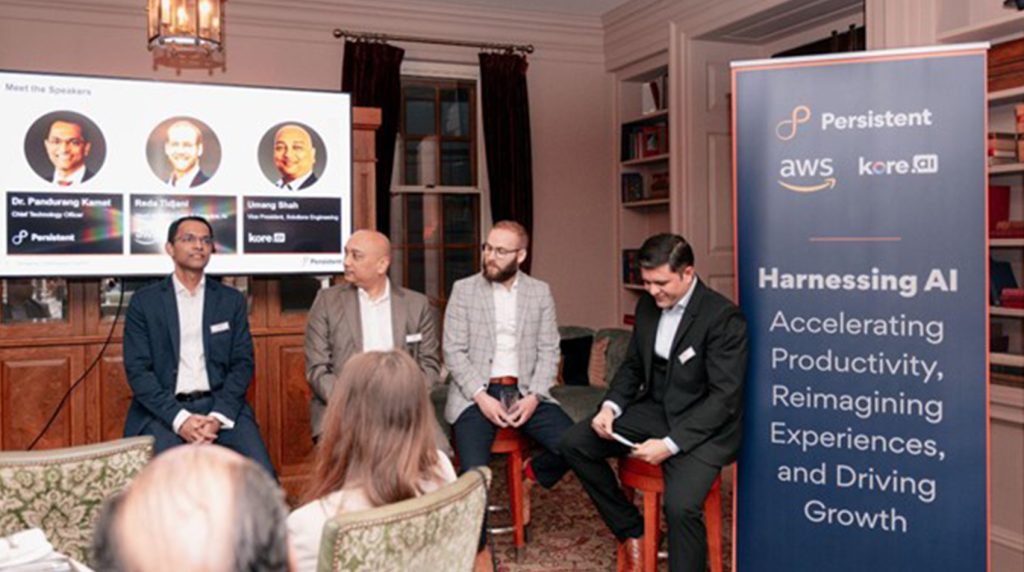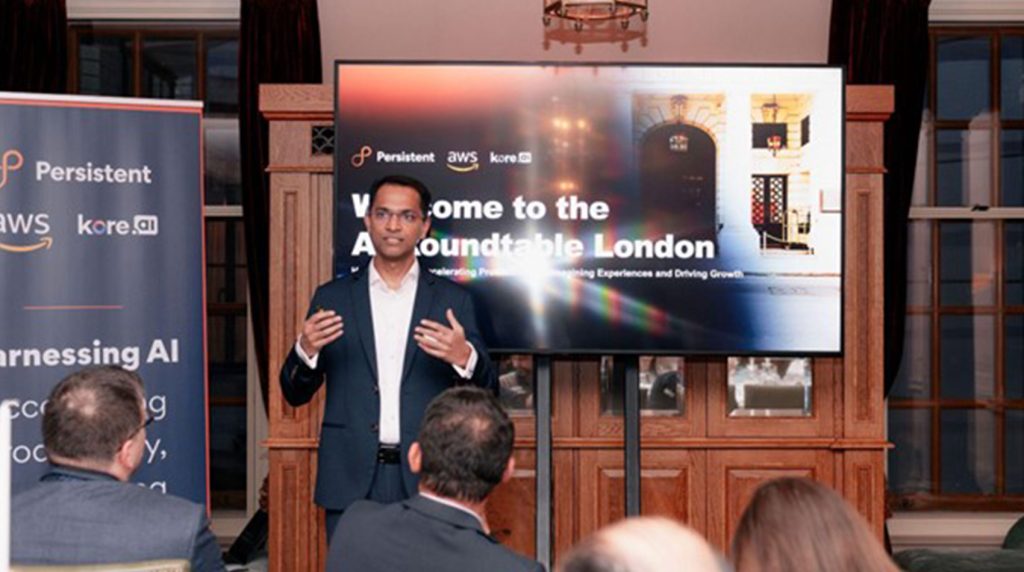AI is quickly becoming the cornerstone of modern innovation. AI’s capability to automate and optimise processes helps businesses boost their productivity while enhancing customer experiences, ultimately propelling business growth. With Generative AI (GenAI) gaining prominence in the last few years, an increasing number of businesses are planning to adopt AI or are in the process of implementing AI in their existing products, processes, and workflows. Even so, many business leaders also have mixed feelings about harnessing AI, concerned about security, privacy, and the technology’s impact on their workforce.
Questions, concerns, and aspirations about AI took centre stage at the recent AI Roundtable held at The Ned, hosted by Persistent Systems together with Amazon Web Services (AWS) and Kore.ai, in London. The roundtable featured insights from three distinguished panellists: Reda Tidjani, Head of AWS Data Partner Business Development; Umang Shah, a digital transformation professional from Kore.ai; and Dr. Pandurang Kamat, CTO of Persistent Systems. Reda underscored AWS’s commitment to innovation, anticipating further disruptive changes, while Umang highlighted GenAI’s revolutionary impact, foreseeing a shift toward SaaS offerings. Meanwhile, Dr. Pandurang expressed his anticipation of significant industry-wide transformation driven by GenAI, emphasising fundamental changes in engineering processes.
Our on the spot graphic recorder summarised the roundtable discussion in this single visual:

Here’s a quick rundown of the key takeaways from the roundtable, highlighting the thoughts of our panellists:
Takeaway #1: Enterprise-grade GenAI gaining momentum
Enterprise-grade GenAI, tailored specifically for large-scale organisations, is quickly gaining speed. Reda told the audience of business leaders and tech practitioners that these kinds of solutions are focused on reliability, scalability, and efficacy to address complex business challenges. He further made the point that AWS recognizes GenAI’s significance and is committed to offering a range of services to meet market demands while also implementing safeguards to maintain data access within enterprise boundaries. Umang points out that many enterprises across various industries are exploring innovative uses of large language models (LLMs), which power GenAI, that extend beyond traditional applications. While many of these initiatives are still in the proof of concept (POC) stage, the potential for GenAI-enhanced applications is immense. He further added that Kore.ai encourages creative thinking, and with this, individuals and organisations create diverse GenAI use cases and applications. Examples include a multinational firm utilising GenAI for data interchange automation, an agricultural leader enhancing customer service with conversational AI and automation, an enterprise software developer company utilising GenAI for data interchange automation, and a company using GenAI to revolutionise sports training.

Takeaway #2: Priorities will shift to security, privacy, and trust
Ensuring ethical, secure, and responsible AI implementation will become critical as enterprise-grade use cases grow. Umang said that he believes that by addressing security, privacy, transparency, ethics, and bias within AI models, safeguarding data becomes more manageable, and that this approach can be seen in Kore.ai conversational AI models as well.
In discussions regarding data quality, security, and privacy within AWS’s AI models and tools, Reda highlighted how AWS prioritises data availability and interoperability, enhancing data quality to explore broader scenarios. For instance, Amazon Bedrock showcases how improved data quality leads to increased accuracy and innovative services.
Persistent’s approach to constructing enterprise-grade applications with GenAI focuses on consistent, high-quality outcomes, emphasising trust and responsible AI adoption. Dr. Pandurang emphasised strategic adoption across functions, prioritising limited data access and effective outcomes. Experience and productivity are central, beginning with formulating the right strategy and roadmap and overlaying them with data guardrails to give internal and external users confidence in AI’s security and data fidelity.
Suggested read: Balancing Ethics and Innovation: How European Businesses Can Capitalise on GenAI
Takeaway #3: AI-powered solutions will redefine customer experience (CX) and employee experience (EX)
The panellists also discussed the effect of AI-powered solutions on customer and employee experiences. Umang elaborated that AI-powered solutions help to understand preferences, anticipate needs, and provide tailored recommendations. This boosts satisfaction and loyalty by creating seamless and intuitive experiences for both customers and employees across various touchpoints. For instance, Kore.ai’s AI-driven chatbots and virtual assistants offer instant support, resolving queries promptly and accurately, thereby improving overall CX and EX.
Persistent’s AI-powered digital engineering and enterprise modernization help businesses elevate their CX and identify new opportunities for growth for employees. Dr. Pandurang further made the point that the emergence of GenAI and LLMs marks a significant turning point for AI and automation. Reda further added that as traditional IT, Customer Experience (CX), and Employee Experience (EX) solutions struggle to keep up, enterprises must capitalise on this opportunity to revamp their existing customer and employee-centric approaches and technology infrastructures with AI.
Takeaway #4: GenAI is versatile and can benefit all industries
Panellists discussed how GenAI’s versatility in transforming experiences is evident across diverse vertical sectors, with many enterprises conducting various pilot projects. Umang said that these experiments are fostering the emergence of new AI players and providers, challenging market leaders, and ultimately reshaping business trajectories.
Reda highlighted that with GenAI’s rapid advancements, expediting the use case lifecycle—from POC to minimum viable product (MVP) to full-scale production—poses significant challenges. Effectiveness at each stage of the cycle requires careful consideration and strategic planning. Organisations are increasingly focusing on implementing roll-outs beyond the POC phase. However the cycle is proceeding within an enterprise, the pivotal aspect remains aligning efforts with the desired outcome and measuring success across all phases. This ensures efficient resource utilisation and meaningful contributions from each stage toward overall objectives.
Persistent believes that to develop a sustainable, long-term GenAI strategy, CXOs must have a strategy that prioritises establishing a strong GenAI foundation involving a deep understanding of the responsibilities associated with AI, data security, and the selection of the right platform for implementing use cases. Dr. Pandurang advised that CXOs should focus on creating awareness across their organisation about the importance of these factors and that consistently evaluating and refining strategies to adapt to new AI advancements and business needs will be crucial for long-term success.

Will AI be truly transformational?
AI’s potential, as highlighted by our panellists, is evident in its ability to enhance efficiency in public administration. However, concerns about authenticity and cost-effectiveness arise as well. Clear regulations are needed to distinguish humans from auto-generated content, particularly in contract responses. The high running costs of expansive AI models are driving a shift towards smaller, industry-focused models. While AI improves internal productivity, its use in customer interactions requires careful consideration and strategic analysis to maximise benefits and minimise risks.
Furthermore, certain patterns emerge while collaborating with customers across industries to implement GenAI, along with variations and unexpected discoveries. While there are commonalities in the engagement process in the initial stages, Persistent acknowledges that as we tailor solutions to fit each customer’s unique environment and requirements, differences become apparent.
Persistent is all set to embrace GenAI solutions to redefine engineering processes for the future. Connect with us today to learn more about how we can help you leverage AI and gain a competitive advantage.
Author’s Profile
Goce Andonov
Chief Marketing Officer (CMO) Persistent Europe







